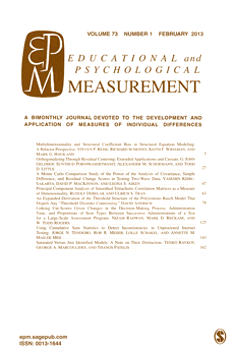
EDUCATIONAL AND PSYCHOLOGICAL MEASUREMENT
Scope & Guideline
Pioneering Innovative Approaches to Measurement
Introduction
Aims and Scopes
- Quantitative Measurement Techniques:
The journal extensively covers quantitative methodologies, including Item Response Theory (IRT), structural equation modeling, and psychometric evaluations that provide robust frameworks for analyzing educational and psychological assessments. - Assessment Validity and Reliability:
A core aim of the journal is to explore the validity and reliability of various assessment tools, ensuring that measurements accurately reflect the constructs they intend to measure. This includes discussions on factor analysis, reliability coefficients, and equating methods. - Innovative Statistical Approaches:
The journal embraces the use of innovative statistical techniques, such as machine learning, Bayesian methods, and nonparametric approaches, to improve measurement practices and to address complex data challenges in educational and psychological research. - Multidimensional and Mixed-Format Assessments:
A significant focus is placed on multidimensional assessments and mixed-format tests, exploring how different item types interact and how they can be effectively modeled to yield meaningful insights. - Addressing Measurement Bias and Fairness:
The journal emphasizes the importance of identifying and mitigating measurement bias, including differential item functioning and social desirability biases, to ensure fairness in educational and psychological assessments.
Trending and Emerging
- Machine Learning Applications:
The integration of machine learning techniques for analyzing educational and psychological data is on the rise, showcasing innovative approaches to detect cheating, improve test scoring, and enhance predictive modeling. - Multilevel and Hierarchical Modeling:
There is an increasing trend in the use of multilevel and hierarchical modeling to address data that is nested or clustered, allowing for more accurate representations of educational and psychological phenomena. - Focus on Response Process Data:
Emerging research emphasizes the importance of incorporating response process data, such as response times and eye-tracking metrics, to gain insights into the cognitive processes underlying test-taking behavior. - Innovative Approaches to Measurement Invariance:
Recent studies are increasingly exploring complex methodologies for assessing measurement invariance across diverse populations, highlighting the importance of fairness and equity in assessments. - Adaptive Testing and Item Response Theory Advances:
Advancements in adaptive testing methodologies and item response theory are trending, with a focus on improving the precision and efficiency of assessments in educational contexts.
Declining or Waning
- Traditional Reliability Estimates:
There has been a noticeable decline in the emphasis on traditional reliability estimates like Cronbach's alpha, as more researchers turn to advanced methods that provide a deeper understanding of measurement properties. - Simple Factor Analysis Techniques:
The journal has seen a waning interest in basic exploratory factor analysis, with researchers increasingly favoring more sophisticated modeling techniques that account for complex data structures. - Single-Method Approaches:
A decrease in publications focused on single-method measurement approaches indicates a shift towards multi-method and integrative frameworks that address the complexities of psychological constructs. - Static Measurement Models:
The focus on static measurement models is declining, as dynamic and adaptive measurement models gain traction, reflecting the growing recognition of the need for real-time data analysis in educational assessments.
Similar Journals
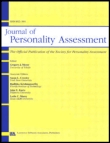
JOURNAL OF PERSONALITY ASSESSMENT
Advancing the Science of Personality EvaluationJOURNAL OF PERSONALITY ASSESSMENT is a leading scholarly publication dedicated to advancing the field of personality evaluation and psychological assessment. Published by Routledge Journals, Taylor & Francis Ltd, this prestigious journal has been serving the academic community since 1971, consistently pushing the boundaries of research through rigorous peer-reviewed articles. With an impressive Q1 categorization across multiple disciplines, including Clinical Psychology, Psychiatry and Mental Health, and Health, Toxicology and Mutagenesis, it ranks among the top journals in its field, reflecting a Scopus Rank of #41/311 in Clinical Psychology and #106/567 in Psychiatry. The year 2024 marks a continued commitment to excellence in psychological assessment, making this journal an essential resource for researchers, practitioners, and students who strive to understand and improve personality assessment methodologies. Although not an open-access journal, the insightful articles and findings published within serve as vital tools for navigating the complexities of human behavior and mental health.
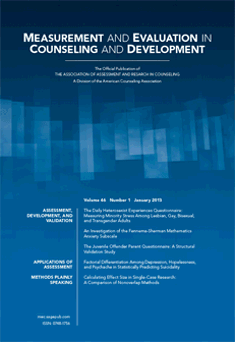
MEASUREMENT AND EVALUATION IN COUNSELING AND DEVELOPMENT
Enhancing Educational Impact with Evidence-Based InsightsMEASUREMENT AND EVALUATION IN COUNSELING AND DEVELOPMENT is a prestigious journal that serves as a vital resource for researchers, practitioners, and educators in the fields of counseling and psychological assessment. Established in 1996 and published by Routledge Journals, Taylor & Francis Ltd, this journal addresses the latest developments in measurement and evaluation techniques as they pertain to counseling practices and developmental psychology. With an impressive recognition in the academic community, it ranks in the Q2 category for Applied Psychology and Developmental and Educational Psychology according to the 2023 rankings. Furthermore, it has earned a Q1 ranking in Education, reflecting its significance in pedagogical assessments. Although it does not offer open access, its rigorous peer-reviewed articles provide critical insights and methodologies essential for advancing knowledge in these disciplines. As the journal looks towards its future convergence of content until 2024, it remains an essential platform for disseminating innovative research and practices, fostering the growth of effective counseling and development methodologies.
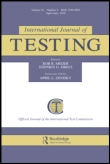
International Journal of Testing
Exploring Innovations in Education and Social PsychologyThe International Journal of Testing, published by Routledge Journals, Taylor & Francis Ltd, stands as a pivotal source of knowledge in the realms of education, modeling and simulation, and social psychology. With an ISSN of 1530-5058 and an E-ISSN of 1532-7574, this esteemed journal is recognized for its commitment to advancing the understanding of testing methodologies and their applications across diverse fields. Currently classified in the Q1 category for both Education and Modeling and Simulation, and Q2 for Social Psychology, it maintains a significant impact, ranking 434th among 1543 journals in Educational Social Sciences. The journal fosters high-quality research discussions, providing a platform for researchers, professionals, and students to share innovative insights and findings. Although it is not open access, the journal ensures that groundbreaking studies are disseminated widely to contribute to ongoing academic discourse until 2024 and beyond. With its headquarters in the United Kingdom at 2-4 Park Square, Milton Park, Abingdon OX14 4RN, Oxon, England, the International Journal of Testing continues to be an invaluable resource for anyone involved in testing theory and practice.
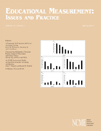
Educational Measurement-Issues and Practice
Elevating Educational Assessment Standards.Educational Measurement-Issues and Practice, published by WILEY, stands as a premier journal in the field of education, recognized for its commitment to advancing understanding of measurement issues and methodologies in educational contexts. Established in 1982, this journal spans over four decades of scholarly contributions, maintaining a remarkable Q1 status within the Education category as per the 2023 metrics, and ranking #407 out of 1543 in Scopus's Education domain, placing it in the top 73rd percentile. It features a range of articles that address critical issues concerning educational assessment practices, policy implications, and innovative measurement methodologies, aimed at professionals, researchers, and students dedicated to enhancing educational assessment frameworks. With its ongoing focus on contemporary challenges and developments in the field, Educational Measurement-Issues and Practice plays a crucial role in shaping effective educational policies and practices worldwide, making it an essential resource for anyone involved in educational research and measurement.

JOURNAL OF PSYCHOPATHOLOGY AND BEHAVIORAL ASSESSMENT
Fostering knowledge for a healthier tomorrow.JOURNAL OF PSYCHOPATHOLOGY AND BEHAVIORAL ASSESSMENT is a prominent scholarly publication dedicated to advancing the field of clinical psychology through innovative research and comprehensive assessments of psychological disorders. Published by Springer/Plenum Publishers in the United States, this journal has an established history of contributing to the academic community since its inception in 1985, continuing its mission until 2024. With an impact factor that properly reflects its academic rigor and relevance, it ranks in the Q2 category in Clinical Psychology for 2023, placing it within the top tier of academic journals in the field. Researchers, professionals, and students can expect to find a wealth of insightful articles that delve into the complexities of psychopathology and behavioral assessment, fostering a deeper understanding of mental health issues. Although open access options are not available at this time, subscribers and institutions have the privilege of accessing critical findings that could transform clinical practices and inform future research initiatives.
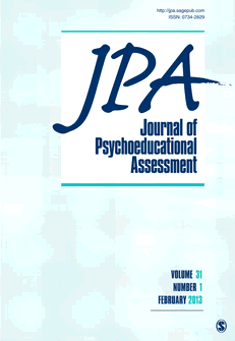
JOURNAL OF PSYCHOEDUCATIONAL ASSESSMENT
Unveiling new perspectives in psychoeducational assessment.The JOURNAL OF PSYCHOEDUCATIONAL ASSESSMENT, published by SAGE PUBLICATIONS INC, serves as a leading platform for disseminating high-quality research in the fields of clinical psychology and education. With its ISSN 0734-2829 and E-ISSN 1557-5144, this distinguished journal has been at the forefront of advancing knowledge since its inception in 1983, and it continues to publish innovative studies aimed at enhancing psychoeducational assessment practices. Recognized in the 2023 category quartiles as Q2 in Clinical Psychology, Education, and miscellaneous Psychology, the journal holds significant rankings in Scopus, with Education at rank #479, Clinical Psychology at #126, and General Psychology at #100, reflecting its substantial impact in the social sciences. Although it does not offer Open Access, the valuable insights provided in its articles contribute meaningfully to the ongoing discourse among researchers, professionals, and students alike. The JOURNAL OF PSYCHOEDUCATIONAL ASSESSMENT is an essential resource for those seeking to enhance their understanding of psychoeducational methods and assessments, ultimately aiming to improve educational outcomes and clinical practices.
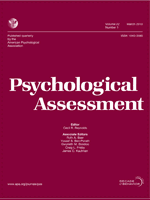
PSYCHOLOGICAL ASSESSMENT
Unlocking Insights in Mental Health AssessmentPSYCHOLOGICAL ASSESSMENT is a prestigious journal published by the American Psychological Association that has been a cornerstone in the fields of Clinical Psychology and Psychiatry and Mental Health since its inception in 1989. With an impressive impact factor, this journal is ranked in the Q1 category for both related fields, showcasing its critical role in disseminating high-quality research and scholarly articles. The journal focuses on the development, validation, and application of psychological assessment tools, inviting contributions that enhance the understanding of mental health through rigorous methodological frameworks. As evidenced by its high Scopus rankings—66th in Clinical Psychology and 165th in Psychiatry and Mental Health—PSYCHOLOGICAL ASSESSMENT is indispensable for researchers, professionals, and students who seek to advance their knowledge and practice in psychological evaluation. While it is not an open-access journal, the insights provided are vital for anyone dedicated to the nuanced study of psychological assessment and diagnosis. For more information, visit the journal's page on the American Psychological Association's website.
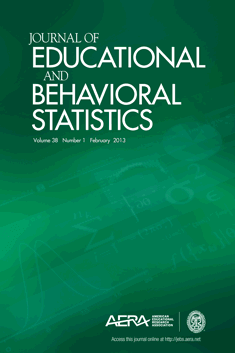
JOURNAL OF EDUCATIONAL AND BEHAVIORAL STATISTICS
Advancing the Frontiers of Educational InsightJOURNAL OF EDUCATIONAL AND BEHAVIORAL STATISTICS, published by SAGE Publications Inc, stands as a pivotal resource in the domains of education and social sciences. With an impressive impact factor reflecting its influence, it is categorized in the esteemed Q1 quartile for both Education and Social Sciences (miscellaneous), positioning it among the top-tier journals in these fields. The journal, bearing the ISSN 1076-9986 and E-ISSN 1935-1054, prides itself on disseminating rigorous research and innovative methodologies applicable to educational and behavioral statistics. Since its inception in 1996, it has continually evolved, featuring cutting-edge studies that address contemporary challenges in educational assessment and statistical techniques. Researchers, educators, and students alike will find invaluable insights within its pages, making it an essential publication for those seeking to advance their understanding and application of statistical methods in education. The journal's commitment to excellence and relevance ensures it remains a cornerstone for scholarly discourse through 2024 and beyond.
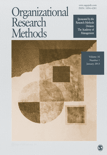
ORGANIZATIONAL RESEARCH METHODS
Empowering Innovation Through Rigorous Research.ORGANIZATIONAL RESEARCH METHODS is a premier academic journal published by SAGE Publications Inc, dedicated to advancing the field of organizational research through innovative methodologies and rigorous empirical studies. With an ISSN of 1094-4281 and an E-ISSN of 1552-7425, this journal has made significant contributions to the disciplines of decision sciences, management of technology and innovation, and strategy and management, holding prestigious Q1 rankings in each category for 2023. The journal's emphasis on methodological rigor and theory development makes it an essential resource for researchers, practitioners, and students alike, facilitating insights that drive effective organizational practices. With a strong impact in the academic community, as evidenced by Scopus rankings placing it in the top percentiles for its related fields, ORGANIZATIONAL RESEARCH METHODS serves as a critical platform for disseminating cutting-edge research from 1998 through 2024, empowering thought leaders to shape the future of organizational studies.
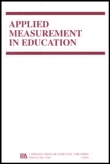
APPLIED MEASUREMENT IN EDUCATION
Transforming education through precise measurement.Applied Measurement in Education is a prestigious journal published by Routledge Journals, Taylor & Francis Ltd, dedicated to advancing the fields of education and developmental psychology. Established in 1988, the journal has played a critical role in disseminating research and theoretical perspectives related to assessment, measurement practices, and educational outcomes. With an impressive standing in the academic community, it is categorized in the Q2 quartile for Developmental and Educational Psychology and the Q1 quartile for Education as of 2023. It ranks #654 out of 1543 in Social Sciences - Education and #203 out of 360 in Psychology - Developmental and Educational Psychology. Though not an Open Access journal, it provides essential insights for educators and policymakers wishing to harness measurement tools for improved educational practice. With a focus on empirical research, theoretical frameworks, and practical applications, Applied Measurement in Education serves as a vital resource for researchers, professionals, and students dedicated to enhancing the effectiveness and fairness of educational assessments.